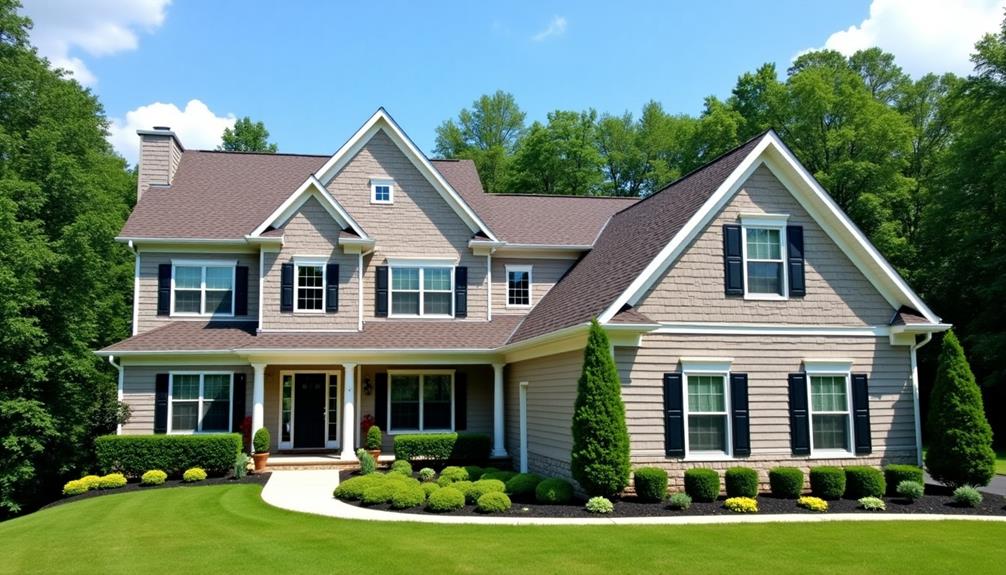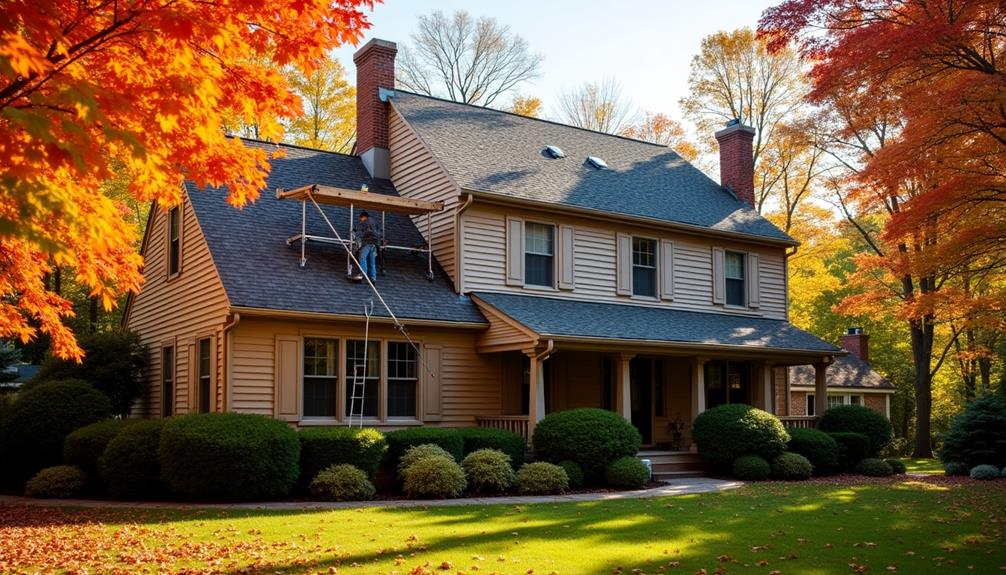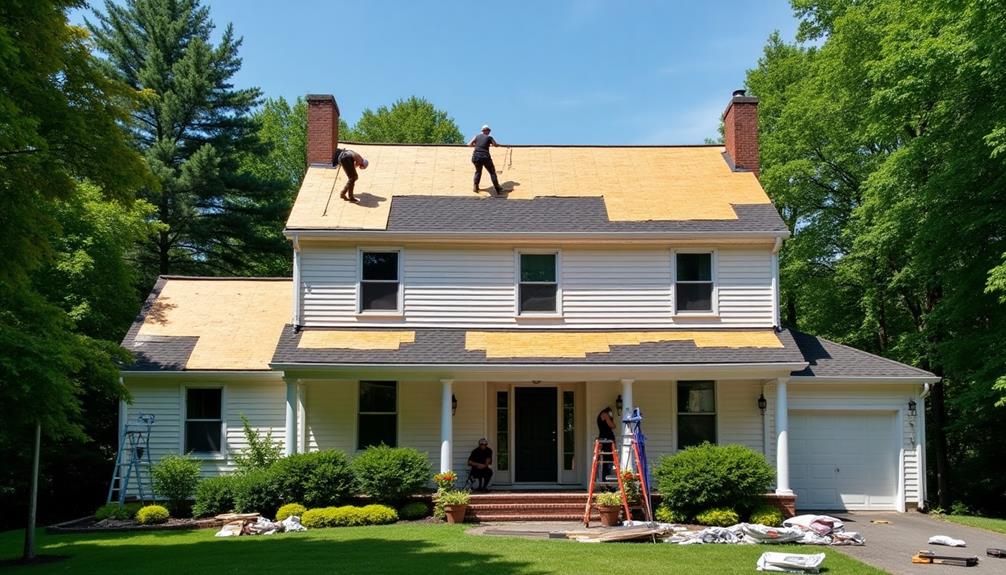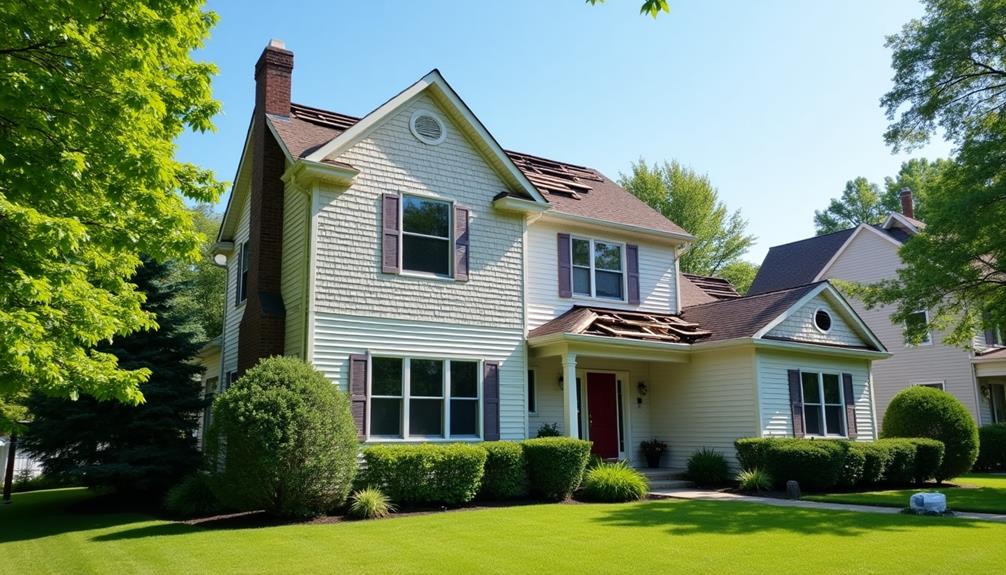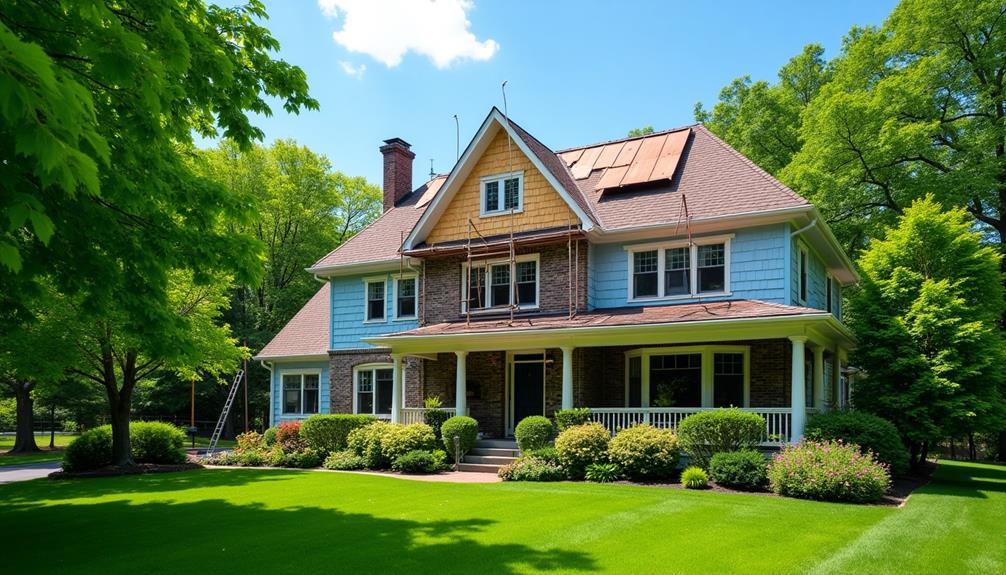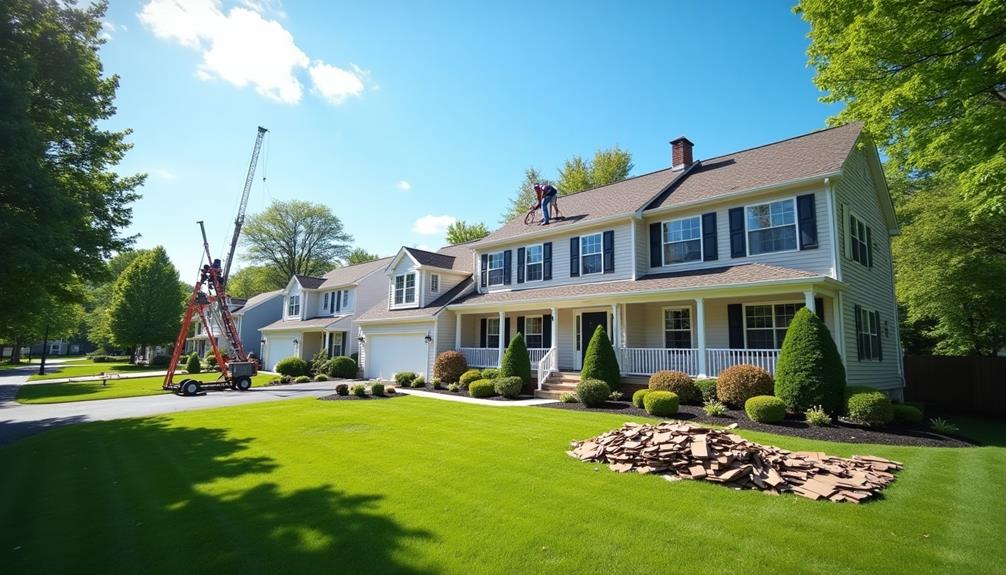If you're considering roof replacement in Lawrence, NJ, you're making an essential investment in your home. Look for signs like leaks, damaged shingles, or an aging roof that's over 20 years old. New roofing enhances energy efficiency, boosts property value, and improves curb appeal. When choosing materials, consider durability and local climate conditions. You'll also want a reputable contractor to assess your needs and navigate local regulations and permits. Understanding the replacement process and costs is crucial for effective planning. To discover more about maximizing your roof's benefits and ensuring longevity, keep exploring available options.
Signs You Need a Roof Replacement
Your roof plays a crucial role in protecting your home from the elements, so knowing the signs you need a roof replacement is essential for maintaining its integrity.
One of the first indicators is the presence of leaks. If you notice water stains on your ceilings or walls, it's time to conduct leak detection. These leaks can signify underlying issues that compromise your roof's lifespan.
Another critical sign is the age of your roof. Most roofs have a lifespan of 20 to 25 years, depending on the materials used. If your roof is nearing the end of this period, proactive replacement can save you from more extensive damage later.
Additionally, check for missing or damaged shingles. Curling, cracking, or missing shingles expose your home to moisture and other environmental factors. Granule loss on asphalt shingles is another warning sign, as it reduces their effectiveness.
Lastly, inspect your roof's overall structure. Sagging areas or excessive wear can indicate serious problems.
Benefits of New Roofing
When you invest in new roofing, you're not just improving aesthetics; you're enhancing energy efficiency, which can lead to significant savings on your utility bills.
A modern roof also boosts your property value, making it more appealing to potential buyers.
These benefits make a roof replacement a smart decision for any homeowner.
Enhanced Energy Efficiency
A well-chosen roofing system can significantly enhance energy efficiency in any home. By opting for modern materials and designs, you'll reduce your energy consumption and lower utility bills.
Energy-efficient roofs reflect sunlight, minimizing heat absorption during hot months, while providing better insulation during colder seasons.
If you're considering solar panels, a new roofing system can be tailored to optimize their installation. Certain roofing materials are specifically designed to accommodate solar technology, ensuring that your system operates at peak performance.
Additionally, combining your roof replacement with insulation upgrades can further amplify energy savings. Proper insulation prevents heat loss in winter and keeps your home cool in summer, allowing your HVAC system to function more effectively.
Increased Property Value
Investing in a new roofing system not only enhances your home's aesthetic appeal but also significantly boosts its overall property value. An updated roof improves curb appeal, making your property stand out in a competitive market. With evolving market trends, buyers are increasingly seeking homes that require minimal immediate repairs. A new roof signals that you're maintaining the property well, increasing buyer confidence.
Here's a quick look at how new roofing can affect your home's value:
| Aspect | Impact on Value | Reason |
|---|---|---|
| Curb Appeal | High | First impressions matter |
| Energy Efficiency | Moderate | Attracts eco-conscious buyers |
| Longevity | High | Less immediate maintenance needed |
| Market Trends | Positive | Aligns with buyer expectations |
Choosing the Right Materials
Selecting the right materials for your roof replacement in Lawrence, NJ, is crucial to ensuring durability and performance. You need to consider both material durability and aesthetic appeal when making your choice. Different roofing materials offer varied lifespans and resistance to the elements. For example, asphalt shingles are popular due to their affordability and decent lifespan, while metal roofs provide exceptional durability and energy efficiency.
Additionally, think about the climate in Lawrence, NJ. Materials like slate or tile may be more suitable for areas prone to heavy rainfall or snow, as they can withstand harsh weather conditions better than others.
When you choose materials that complement your home's architecture, you enhance its aesthetic appeal, which can significantly impact curb appeal and property value.
Don't overlook the importance of warranties, either. Quality materials often come with strong warranties, giving you peace of mind for years to come.
Understanding the Replacement Process
Understanding the roof replacement process is essential for homeowners in Lawrence, NJ, as it can significantly impact the project's success and longevity.
First, you'll want to schedule a consultation with a reputable roofing contractor who'll assess your current roof's condition and discuss your needs. This initial evaluation will help establish a comprehensive roofing timeline, detailing each phase of the project, from material delivery to final inspection.
Once you've chosen your materials, the contractor will provide a detailed plan, covering the expected start and completion dates. During installation, ensure the contractor adheres to local building codes and best practices to avoid future issues.
It's also crucial to discuss the replacement warranty. A solid warranty can safeguard your investment by covering potential defects or installation errors.
Throughout the process, maintain open communication with your contractor. This ensures you remain informed and can address any concerns promptly.
Cost Considerations
When planning a roof replacement in Lawrence, NJ, homeowners should be prepared for a range of costs that can vary significantly based on materials, labor, and the complexity of the project. The average cost can range from a few thousand dollars to tens of thousands, depending on the choices you make. High-quality materials, such as metal or slate, generally come with a higher price tag but offer greater durability and longevity.
You should also consider financing options. Many contractors provide flexible payment plans or partner with financial institutions to help ease the burden. This can be a smart way to manage your budget while ensuring you choose the best materials for your home.
Additionally, check your insurance coverage. Many homeowners' insurance policies cover part of the roof replacement costs, especially if the damage is due to a covered peril like a storm. Understanding your policy can save you a significant amount of money.
Hiring a Qualified Contractor
After you've assessed the costs involved in a roof replacement, the next step is finding a qualified contractor who can bring your project to life. Hiring a contractor with the right qualifications and experience is crucial to ensuring your new roof is durable and well-installed.
Start by researching potential candidates. Look for contractors with established reputations, relevant certifications, and positive reviews. Here's a quick reference table to help you evaluate your options:
| Qualification | Importance | Questions to Ask |
|---|---|---|
| Insurance and Licensing | Protects you from liability | Are you licensed and insured? |
| Industry Experience | Ensures expertise in roofing | How many years have you been in the business? |
| Warranty Offerings | Guarantees quality of work | What warranties do you provide? |
Make sure to ask about their contractor experience with similar projects. A contractor who specializes in roof replacements will likely understand the nuances that can affect the installation process. Ultimately, hiring a qualified contractor not only saves you time but ensures your investment is protected for years to come.
Local Building Regulations
Before you start your roof replacement project, it's essential to familiarize yourself with local building regulations. Understanding these rules not only ensures compliance but also protects your investment.
In Lawrence, NJ, zoning laws dictate what you can and can't do on your property, influencing aspects like roof height and materials used. Make sure to check these guidelines before proceeding.
Permit requirements are another critical factor. Most roof replacements will require a permit, and failing to obtain one can lead to fines or even mandated removal of the new roof.
To secure your permit, you'll typically need to submit detailed plans and specifications of your project, so be prepared with comprehensive documentation.
It's also wise to consult your contractor, as they should be well-versed in local regulations. They can help navigate through the permit process and ensure that all work meets safety and structural codes.
Ignoring local building regulations can lead to significant delays and costs, so investing the time upfront is invaluable. By adhering to these requirements, you'll not only ensure a smoother replacement process but also enhance the longevity and value of your home.
Maintenance Tips for Longevity
Having ensured compliance with local building regulations and secured the necessary permits, maintaining your new roof is vital to its longevity.
Regular roof inspections should be part of your maintenance routine. Aim for at least two inspections per year—once in the spring and once in the fall. These inspections help identify potential issues like missing shingles, cracks, or signs of wear that could escalate if left unaddressed.
Seasonal maintenance is equally important. In the fall, clear gutters and downspouts of debris to prevent water backup. This step is crucial for avoiding rot and leaks.
During winter, inspect for ice dams, which can cause significant damage if not managed.
In the spring, check for signs of wear and tear after the harsh winter months. Look for any leaks or water stains inside your home, as these can indicate roofing problems.

